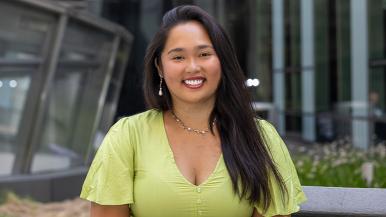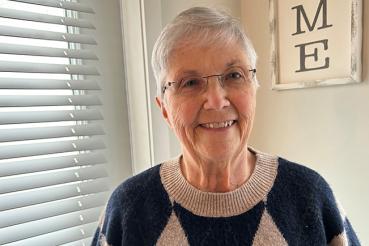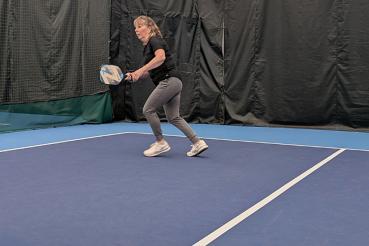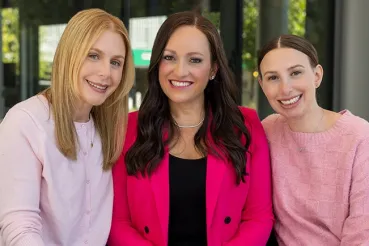In 2021, I was teaching as a special education teacher in a high school in Chicago and was in the second year of my PhD program. I was that person who signed up to do everything and wanted to learn, grow and expand my ways of thinking all the time.
However, I found myself constantly exhausted and struggling with an incessant cough, making it difficult to teach. My first worry was that I had COVID-19 and was experiencing long-term effects. I never thought I would have lung cancer.
My name is Aurora Lucas, and I am a part of the Filipino diaspora. My family moved from the Philippines in 2002 when I was only 9 years old. Currently, I am a researcher in training, in the last year of my EdD program. I currently speak Filipino, English, Spanish, and I am learning Ilocano (my father's native language) and hope to learn many more languages with the time I've been given.
Living with lung cancer
The journey to my diagnosis was arduous and frustrating. My previous doctors were in denial about the possibility of cancer. They were hopeful that what I had was either tuberculosis or some sort of infection due to my background as an immigrant and the country that I came from. And with the anti-Asian hate crimes going on at that time in the United States, my mind was going everywhere. I encountered numerous challenges, including insurance delays and incorrect orders due to my HMO plan. I found myself in and out of emergency rooms, where no conclusive answers were provided.
It was during this time that a tumor was discovered, alongside another concerning finding involving my heart (I also learned that I had Wolff-Parkinson-White syndrome). I also underwent a biopsy, which unfortunately failed, leading to an agonizing wait of 10 days for the results.
But on Dec. 6, 2021, I was diagnosed with stage three-A lung cancer.
A second opinion at RUSH
Thankfully, with the support of my family and friends, I navigated through the medical system and sought a second opinion at RUSH. Talking to Philip Bonomi, MD, and Gaurav Marwaha, MD, at RUSH, I found them genuinely interested and concerned with what I had to say. Despite feeling guilt towards leaving my previous health care team, I realized that my case as a 28-year-old was rare and that seeking a second opinion was the best decision for my health.
From my very first encounter, it was evident that RUSH was different. The team of health care professionals was dedicated and empathetic. I felt reassured that I was with the team that had answers. The medical team provided me with a personalized treatment plan tailored specifically to my unique circumstances, involving me in decisions regarding my care. They changed my original treatment plan, and this time, it was with less side effects. It was a huge relief to hear that, considering how terrifying it is to learn about the multitude of side effects experienced by patients with lung cancer.
Anyone can have lung cancer
Lung cancer is the most common cancer worldwide, with 2.1 million new cases and 1.8 million deaths reported in 2018. Most people diagnosed with lung cancer are 65 or older. A very small number of people diagnosed are younger than 45. The average age of people when diagnosed is about 70.
Living with a diagnosis of stage 3-A lung cancer at age 28 is a life-altering experience filled with moments of having to speak up for what my body was feeling. Lung cancer, although unseen, stands as a prominent global contributor to cancer cases.
I often think of my grandmother, whose name is also Aurora Lucas, and how she passed away in 1992 from stage four lung cancer. I never got to meet her, but I know that her DNA literally lives in my veins.
Perhaps, me having lung cancer now is a coincidence, but I am the one who is able to speak for us and for my family. My family, and other people of color, who deserve dignity with care and compassion. I dream and envision talking to patients with lung cancer from all walks of life and languages across the world. Lung cancer is an invisible health epidemic, and you would never know someone has it unless they tell you. Today, the reality is that if you have lungs, you can have lung cancer.
‘I can still dream’
I dream of a future where delayed and dehumanizing diagnoses become a thing of the past. I dream of a future where patients with lung cancer receive care with dignity, just like I have with my RUSH health care team.
If I could give advice to a future patient with lung cancer, I would tell them to check their insurance and seek an opinion at RUSH. It could literally save their life. Dealing with insurance is another challenge we face in this country, but there is hope. I would also urge them to ask questions about the future of their fertility possibilities, since there are so many side effects that affect this during treatment. I have hope in the doctors, nurses and staff members at RUSH because they are genuine people who try their best to use their compassion and knowledge to help people have a better quality of life.
I am grateful to my health care team at RUSH. This is an open letter of gratitude to Dr. Marwaha, Dr. Bonomi, Irene Haapoja, CNS, Sarah Anderson, NP, and Susana Banda, RN. Their ethic of care was so humanizing at a time when I didn't know if I would be alive or have a good quality of life after my treatments. They went above and beyond, not just giving me medicine but helping me keep my dreams alive. They saw me for the person that I am and told me that I could still dream, that my cancer isn't going to stop me from pursuing my dreams.
As an immigrant, I've experienced and witnessed many horrible stories about how doctors in the United States treat people of color. Thankfully, this was not the case with my RUSH medical team, and they have earned my trust.
I have learned that I can still dream, even though I now face a different reality in life. I daydream about a world that is better for patients with lung cancer and their families.




